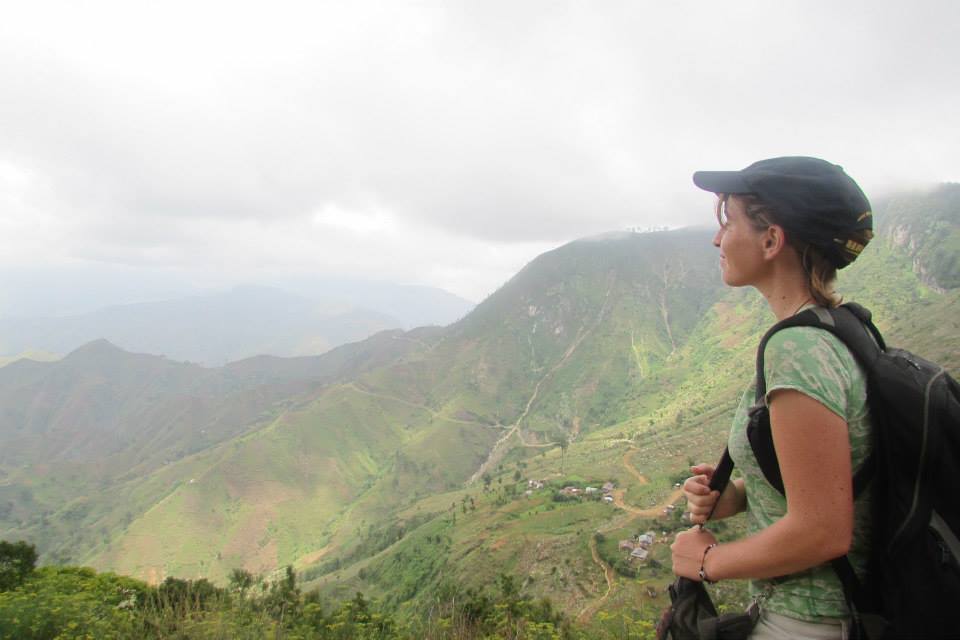Remembering Sabina Robillard
Sabina Carlson Robillard passed away on November 16, 2022, after a long battle with cancer. The Feinstein International Center and the whole Friedman and Tufts community mourn her passing and will miss her greatly.
Sabina was a fierce advocate who dedicated her life to putting disaster-affected communities at the center of disaster response.
“I care immensely about the work that I do and its value in the world. These are peoples’ lives, their livelihoods, their children’s health, and their futures. If we do not approach this work thoughtfully with full consideration for the humanity and agency of the people we work with, we can inflict real damage. But if we can do it well, we can make real, positive, and lasting changes.”
On January 12th, 2010, a magnitude 7 earthquake struck Haiti. This resulted in hundreds of thousands of deaths, millions of people displaced, and an unprecedented challenge for the humanitarian community. It also provided Sabina, one of the Tufts students responding to the earthquake, with experiences that shaped her understanding of her place in the humanitarian system. Appalled at the way in which the international community took charge of the earthquake response and effectively barred local Haitian actors from the efforts of the international response, Sabina became a passionate advocate for the voices of the affected population and the affected country in humanitarian disasters—ideals that would later come to be known as “accountability to affected populations” and localization.
In 2017, she decided to make localization the focus of her PhD research, with Haiti as her primary case study. Sabina led much of the Feinstein International Center’s work on localization.
Between 2017 and 2022 she completed case studies on localization in places as diverse as Haiti, South Sudan, Iraq, Colombia, and Sulawesi (Indonesia).
She developed the first ever database of evidence on localization in 2018. The database drew from a wide range of sources from the humanitarian sector and academia. From 2021-2022, she collaborated with Save the Children as they developed their Localization Collection for their Resource Center. She helped Save integrate her database into their collection and ensure that the collection was as representative as possible of the diversity of humanitarian responders and the communities with whom they work.
Beginning in 2020-21, Sabina was the lead researcher on Feinstein study on the localization of humanitarian action and the decolonization of the humanitarian sector for the Bureau of Humanitarian Assistance of USAID. That study was completed earlier this year. Less than a month before her passing, the Bureau issued a new policy on their commitment to localization and building support for locally led humanitarian action. This new policy repeatedly cites the results of the study that Sabina led—a fitting tribute to all the work that she had done in this field.
Much of Sabina’s education revolved around Tufts, where she is remembered by faculty for being as much a teacher in the classroom as a student. She held a bachelor’s in community health, peace, and justice from Tufts. She completed a master’s in food policy and applied nutrition at the Friedman School and a master’s in applied community change and peacebuilding from Future Generations Graduate School. She was working on her PhD at the Friedman School when she passed.
While at Tufts, Sabina also served as the student coordinator for the Master of Arts in Humanitarian Assistance (MAHA) program, and served five different cohorts of MAHA students, as their advisor, compatriot, “helpdesk,” and friend. MAHA alumni around the world remember Sabina for her calm demeanor, her ever-helpful responses, and her willingness to be supportive or just listen when students needed a friendly ear.
In addition to working at the Feinstein International Center, Sabina has worked for the International Organization on Migration in Haiti and Guinea, CDA Collaborative Learning, and several local organizations in Haiti. She helped found the Humanitarian Women’s Network, to promote humanitarian women’s voices and priorities for reforming the humanitarian industry, which has grown to several thousand members around the world. She also was a partner with her husband, Louino Robillard, in founding a number of community-driven organizations in Haiti, like Kombit Soley Leve, Pak Nan Ginen, and a huge movement to build a community library in City Soleil with an exemplary model of accountability.
Sabina was a dedicated and loving mother to her two daughters she shared with her husband Robi, Ana and Dayana. She often brought her high energy and charming little one Ana to classes and outings, where she was adored by all. She loved and co-parented Dayana with Robi and Dayana’s mother (Beldor) with whom she had a warm relationship.
The Boston Globe published her obituary on December 4, 2022.


